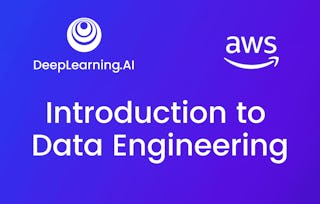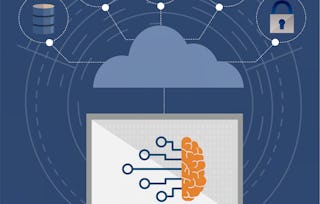Welcome to the third course in the Building Cloud Computing Solutions at Scale Specialization! In this course, you will learn how to apply Data Engineering to real-world projects using the Cloud computing concepts introduced in the first two courses of this series. By the end of this course, you will be able to develop Data Engineering applications and use software development best practices to create data engineering applications. These will include continuous deployment, code quality tools, logging, instrumentation and monitoring. Finally, you will use Cloud-native technologies to tackle complex data engineering solutions.

Cloud Data Engineering

Cloud Data Engineering
This course is part of Building Cloud Computing Solutions at Scale Specialization

Instructor: Noah Gift
15,876 already enrolled
Included with
92 reviews
Recommended experience
Skills you'll gain
- Data Pipelines
- Distributed Computing
- Google Cloud Platform
- Data Governance
- Data Lakes
- Serverless Computing
- Cloud-Native Computing
- Cloud Storage
- Amazon Web Services
- NumPy
- Python Programming
- Command-Line Interface
- Cloud Technologies
- Rust (Programming Language)
- Cloud Computing
- Software Engineering
- Big Data
- Extract, Transform, Load
- Skills section collapsed. Showing 11 of 18 skills.
Details to know

Add to your LinkedIn profile
16 assignments
See how employees at top companies are mastering in-demand skills

Build your subject-matter expertise
- Learn new concepts from industry experts
- Gain a foundational understanding of a subject or tool
- Develop job-relevant skills with hands-on projects
- Earn a shareable career certificate

There are 4 modules in this course
This week, you will learn about the methodologies involved in Data Engineering. You will also learn to evaluate best practices for dealing with the end of Moore’s Law, develop distributed systems that apply software engineering best practices and evaluate best practices for implementing solutions with Big Data. You will apply these practices to build a GPU programming project using Numba and the CUDA SDK.
What's included
25 videos23 readings5 assignments4 discussion prompts3 ungraded labs
This week, you will learn what Data Engineering is and how to use software engineering best practices in Data Engineering. You will then apply this knowledge by building a command-line data processing tool.
What's included
16 videos10 readings4 assignments3 discussion prompts4 ungraded labs
This week, you will learn serverless data engineering techniques and data governance best practices. You will then apply this knowledge by building a serverless Data Engineering system.
What's included
23 videos7 readings3 assignments2 discussion prompts
This week, you will learn about key Data Engineering tasks including ETL, Cloud Databases and Cloud Storage. You will then apply this knowledge by building a serverless AWS lambda function that labels an image using the AWS Rekognition API.
What's included
20 videos11 readings4 assignments3 discussion prompts4 ungraded labs
Earn a career certificate
Add this credential to your LinkedIn profile, resume, or CV. Share it on social media and in your performance review.
Instructor

Offered by
Explore more from Cloud Computing
 Status: Free Trial
Status: Free TrialDeepLearning.AI

Google Cloud
 Status: Free Trial
Status: Free TrialWhizlabs
 Status: Free Trial
Status: Free TrialDuke University
Why people choose Coursera for their career

Felipe M.

Jennifer J.

Larry W.

Chaitanya A.
Learner reviews
- 5 stars
52.17%
- 4 stars
25%
- 3 stars
7.60%
- 2 stars
9.78%
- 1 star
5.43%
Showing 3 of 92
Reviewed on Dec 30, 2021
Very important information and concepts was shared.

Open new doors with Coursera Plus
Unlimited access to 10,000+ world-class courses, hands-on projects, and job-ready certificate programs - all included in your subscription
Advance your career with an online degree
Earn a degree from world-class universities - 100% online
Join over 3,400 global companies that choose Coursera for Business
Upskill your employees to excel in the digital economy
Frequently asked questions
To access the course materials, assignments and to earn a Certificate, you will need to purchase the Certificate experience when you enroll in a course. You can try a Free Trial instead, or apply for Financial Aid. The course may offer 'Full Course, No Certificate' instead. This option lets you see all course materials, submit required assessments, and get a final grade. This also means that you will not be able to purchase a Certificate experience.
When you enroll in the course, you get access to all of the courses in the Specialization, and you earn a certificate when you complete the work. Your electronic Certificate will be added to your Accomplishments page - from there, you can print your Certificate or add it to your LinkedIn profile.
Yes. In select learning programs, you can apply for financial aid or a scholarship if you can’t afford the enrollment fee. If fin aid or scholarship is available for your learning program selection, you’ll find a link to apply on the description page.
More questions
Financial aid available,

